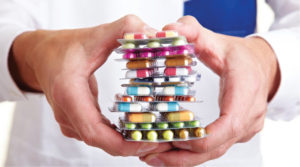Table of Contents
Adverse effects due to drugs. What the patients should know? This article helps us to understand what we have to do to prevent problems arising out of adverse events arising due to drugs.


It is important to understand that side effects are different from adverse drug reactions. Side effects are simple unpleasant and unavoidable effects that medicines have on your body while treating your symptoms. A few examples are nausea, dizziness, or bleeding in your gastrointestinal (GI) tract which patient can experience when he is taking pain killers or antibiotics or slight drowsiness developing when he takes antihistamines (anti allergic drugs).
Adverse drug reactions (ADR):
WHO defines ADR as a response to a drug which is noxious and unintended, and which occurs at doses normally used in man for the prophylaxis, diagnosis, or therapy of disease, or for the modification of physiological function. For our understanding here we shall not try to differentiate between the two and take it as a single entity. ADRs are one of the leading causes of morbidity and mortality in health care. The Institute of Medicine reported in January 2000 that about 44,000 to 98,000 deaths occur annually from medical errors. Of this total, an estimated 7,000 deaths occur due to ADRs. To put this in perspective, consider that 6,000 Americans die each year from workplace injuries. In the US drugs are behind heart disease, cancer and strokes as the leading cause of death
In view of the poor reporting and data available in our country, it is difficult to estimate but certainly we need to put a much higher figure. The process of prescribing a medication is complex and includes the following steps: deciding that a drug is indicated to treat the illness; choosing the best drug; determining a dose and schedule appropriate for the patient’s physiologic status; monitoring for effectiveness and toxicity, educating the patient about expected side effects, and indications for seeking future consultation. The misuse and consequences of adverse drug events can occur in any of the process listed above.
What factors cause adverse drug reaction?
ADRs are complex clinical problems that involve 3 key variables: the person; the drug; and the event. Each one of these factors has multiple aspects that could be involved in leading to an ADR. Let us discuss a few.
Patient related factors:
For the person: There are multiple variables to consider. For example, risk factors, such as Age, sex, illness, severity of illness, genetic predisposition to suffer drug reactions, comorbid features, poor renal or liver function, etc., may be involved.
- As you age, body changes can affect the way medicines are absorbed and used. Changes in body weight and our gastro intestinal system can influence the amount of medicine you need to take and how long it stays in your body. The circulation system may slow down, which can affect how fast drugs get to the liver and kidneys. The liver and kidneys also may work more slowly affecting the way a drug breaks down and is removed from the body. Because of these body changes, there is also a bigger risk of drug interactions for older adults.
- More number of drugs increases the chances for more adverse drug reactions. It is not unusual to see patients taking more than 10 medicines in a day. Studies have shown that the rate of ADRs increases exponentially after a patient is on 4 or more medications.
- Drug-drug interactions happen when two or more medicines react with each other to cause unwanted effects. This kind of interaction can also cause one medicine to not work as well or even make one medicine stronger than it should be. For example, one should not take aspirin if you are taking a prescription blood thinner, such as Warfarin, unless your health care professional tells you to.
- Drug-condition interactions happen when a medical condition you already have makes certain drugs potentially harmful. For example, if you have high blood pressure or asthma, you could have an unwanted reaction if you take a nasal decongestant.
- Drug-food interactionsresult from drugs reacting with foods or drinks. Several drugs are known to interact with foods – the reduced absorption of tetracycline when taken with milk products; Dietary sources of vitamin K, such as spinach or broccoli, may increase the dosage requirement for warfarin. Grapefruit juice contains a bioflavonoid that inhibits CYP3A and thus blocks the metabolism of many drugs.
- Drug-alcohol interactionscan happen when the medicine you take reacts with an alcoholic drink. For instance, mixing alcohol with some medicines may cause you to feel tired and slow your responses. Taking some medications like metronidazole can cause sometimes life threatening reactions.
Drug factors: the dosage of the drug given; etc. can all play a role in adverse drug reaction.
Some of the other factors related to drug implicated in causing ADR are
- Dosage, duration of use, known toxicity, timing of administration, and other variables may be involved.
- The metabolites of the drug after its chemical transformation;
- Alterations in any enzymes involved in drug metabolism;
- Genetic defects in some individuals leading to altered drug metabolism
- Missed dose: not taking drug as prescribed.
- Wrong technique: not taking the medicine as recommended. E.g. injection instead of tablet.
- Illegible order: not able to understand the medicine prescribed.
- Duplicate therapy: taking or giving medicines repeatedly.
- Drug-drug interaction.
- Inadequate monitoring.
- Preparation error.
For the event: Nature and severity of the disease (e.g. Viral fevers, cancers etc.); new medical problems could play a role in causing more reactions. Pre-existing medical diseases: presence of diseases like liver diseases, kidney diseases, Diabetes Mellitus, Hypertension, viral infections, cardiac diseases, thyroid diseases, cancers, HIV infection etc. pre dispose the individual to more susceptibility to adverse drug reactions.
Who are more susceptible to develop ADRs?
Research has not yet identified any valid predictors to anticipate who will suffer from ADR and what medications will cause an ADR. Patient characteristics currently are not useful predictors of an ADR. No cause and effect relationship is known to exist between patients who suffer ADRs and age, comorbidity, or number of drugs received. However, ADRs are more likely to result in life-threatening consequences in intensive care unit (ICU) patients than in others. Therefore it is essential and wise to move with the assumption that every patient who is taking a medicine is a potent candidate to suffer from adverse drug effects.
How to say when you have developed an ADR?
The following clinical features are suggestive of an ADR, especially if it occurs after taking a new drug:
- Skin rash
- Easy bruising.
- Bleeding
- Severe nausea and vomiting
- Diarrhea
- Constipation
- Confusion
- Breathing difficulties
What should be done if you suspect ADR?
Stop taking all the medications that you have started recently as newer drugs have more chance of causing ADRs.
Contact your physician either in person or by phone or mail etc. Explain to him about the situation and seek advice whether to continue with the medicines or not. Follow his advice.
If the doctor cannot be contracted and if you perceive your condition alarming rush to a nearby physician or a hospital. Explain the sequence of events properly and seek their advice.
What is the role of the patient when he is advised to take the medicine?
Though patients current knowledge level may not be uniform, it is essential that every patient should understand the following when is getting prescribed for medicines. Always understand clearly the instructions, and if you have any doubt do not hesitate to question the doctor.
- Generic and brand names of the medication.Patients should know both the brand and generic names of each medication as it helps them identify their medications when a generic equivalent is substituted for a brand name version.
- Purpose of the medication.Patients should understand what the therapeutic benefit of the medication will be, and the consequences of not taking the prescribed medication. For example, a patient may be more likely to take blood pressure medication if told lowering high blood pressure will prevent heart attack, kidney disease, or stroke, rather than saying only that it will lower blood pressure.
- Dosage and how to take the medication. Patient must know how much of the medication to take and when to take it. Patient must also be informed of the best time to take the medication, for example, on an empty or a full stomach, before bedtime, or with or without other medications.
- What to do if a dose is missed.Ask the doctor what should be done if he misses taking the dose.
- Duration of therapy.It is not uncommon for patients to stop taking a medication either when they feel better or when they cannot perceive a benefit. Some patients need to understand that the medication needs to be taken for life long to help maintain the current level of wellness (e.g. Heart diseases, diabetes, Hypertension, Stroke etc). Some medications cannot be discontinued abruptly and patients should slowly and gradually taper the medicines dosage and then stop it. Take the clear instructions from the doctor.
- Minor side effects and what to do if they occur.Always understand that all medications have potential side effects. Ask the doctor about any common and minor side effects and how to manage them if they occur. An informed patient is less likely to stop taking a medication because of a minor and potentially avoidable side effect.
- Serious side effects and what to do if they occur.Though medicines itself may not be the cause of all fresh symptoms it is worthwhile to talk to the physician about it and take further instructions regarding the continuation of medicine and what to be done to alleviate the new symptoms.
- Medications to avoid.Always inform the doctor about the medications you are already taking if any, as Drug-drug interactions can increase side effects, or even cause life-threatening adverse events such as cardiac dysrhythmias, hepatitis, renal failure, or internal bleeding.
- Foods to avoid and other precautions.Food-drug interactions are not uncommon and can have effects similar to drug-drug interactions. Similarly other activities like Excessive sun exposure, affecting alertness or coordination etc. should be understood so as to avoid such activities.
- How to store the medication:some medications must be stored properly to maintain potency. Discuss this with your doctor whether they need to be stored in refrigerators or in dark cabinets etc. In addition, thoughtful storage practices, such as separating two family members’ medications, can prevent mix-ups and inadvertent accessibility
- Follow-up care.Whenever you are taking certain medications it requires monitoring to assess effectiveness and any side effects. Many medications require invasive and noninvasive testing to monitor blood levels; hematopoietic, hepatic, or renal function; or other effects on other body systems. The results may lead to dosage adjustments, change in medication, or discontinuation of medication. Follow the instructions carefully.
- What not to take.Avoid taking expired medications or someone else’s medication as a substitute. Avoid taking medicine of ole prescription even if for similar complaints.
- Finally make sure that you clearly understood what the doctor has explained to you. If required repeat all the instructions he has given. Also if you have any difficulties in understanding ask questions and get your doubts clarified. Making notes in your own language may also not be a bad idea.
- Tell your team of health care professionals about all the medicines you take, including prescription and over-the-counter medicines, such as pain relievers, antacids, cold medicines, and laxatives. Don’t forget to include eye drops, dietary supplements, vitamins, herbals, alternative medicines and even topical medicines, such as creams and ointments.
- Tell your health care professional about your medical history. The doctor will want to know if you have any food, medicine, or other allergies. He or she also will want to know about other conditions you have or had and how you are being treated or were treated for them by other doctors.
Drugs will form the first line of defence in war against diseases. And it will continue to be so. The possibility of adverse drug reactions can never be eliminated as long as we are using drugs. The possibility of an adverse drug event (ADE) should always be borne in mind when evaluating any patient; any new symptom should be considered drug-related until proven otherwise.
Whenever the patient visits a doctor it is essential the issues of periodic review of current drug therapy; discontinuing unnecessary medications; considering safer alternative medications should be discussed. Considering nonpharmacological alternative strategies like life style measures and alternate methods of non-drug therapies should be supplemented along with medications to help reduce the adverse effects of drugs.


Dr Bhanu Prakash
Professor, Dept. of Dermatology, Vydehi Hospital, Whitefield, Bangalore – 66
Ph: 080-28413381/2/3/4 www.vims.ac.in











